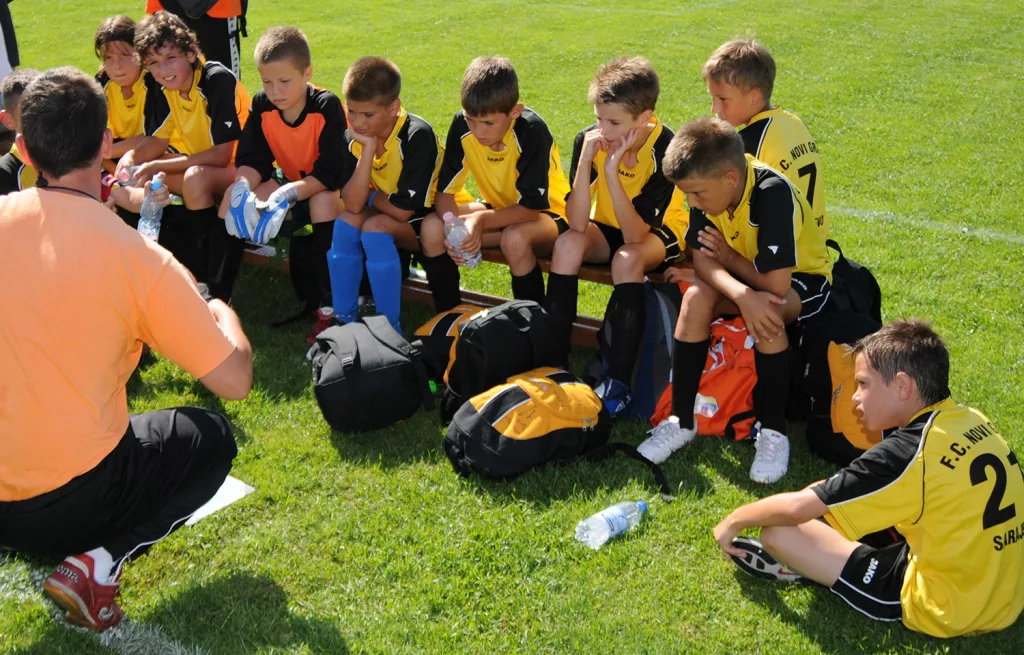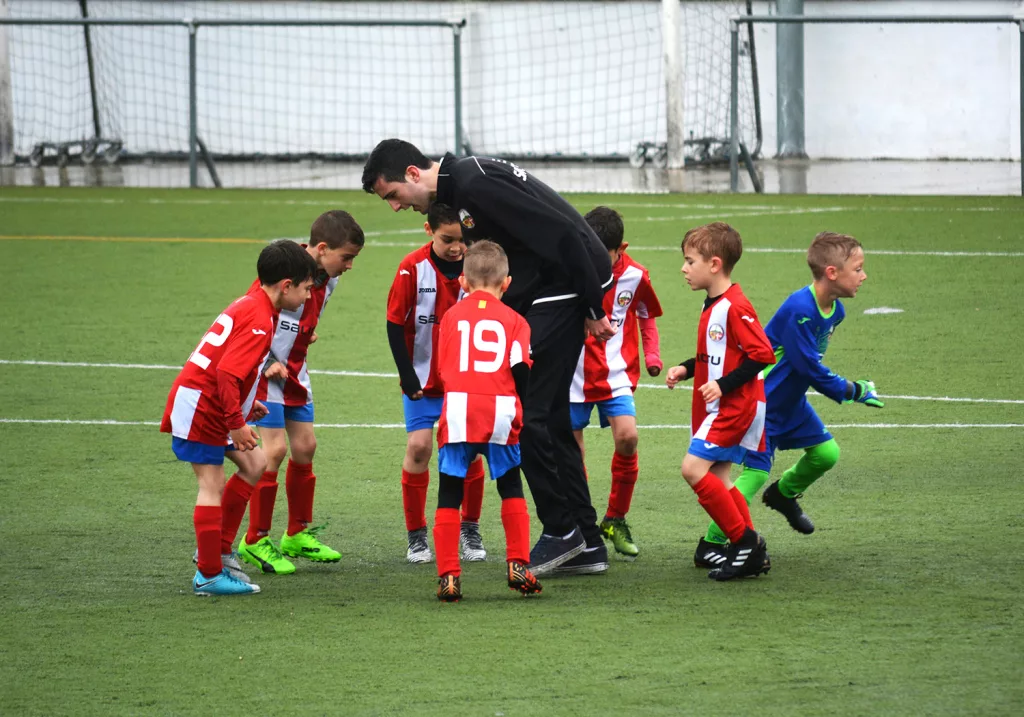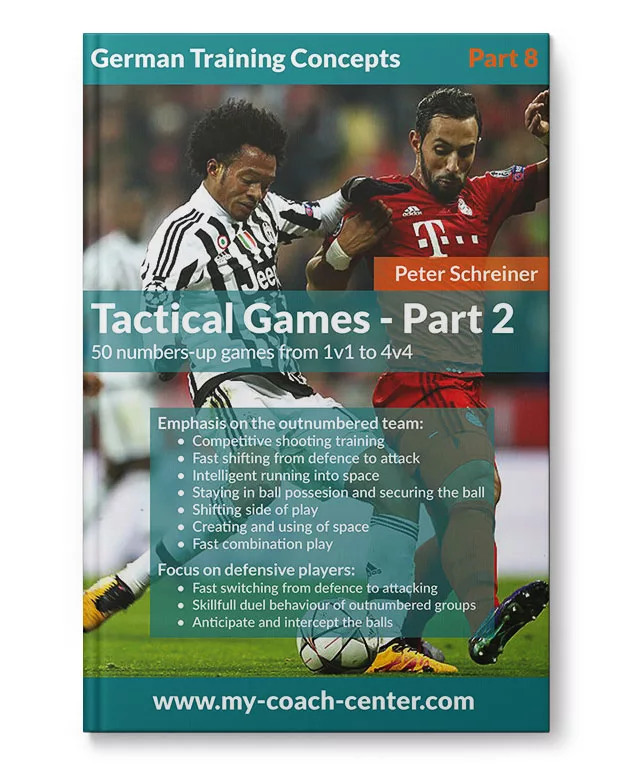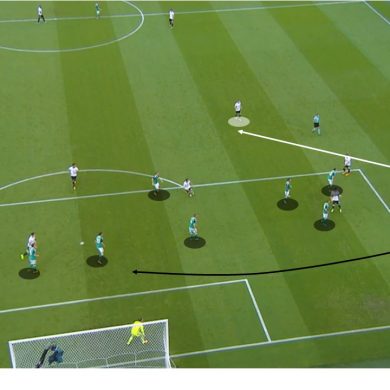Effective coaching of young players requires much more than just teaching techniques and tactics; it requires a deep understanding of the art of coaching both on and off the field. Fabian Seeger, the head of the youth academy of german soccer club FC St. Pauli, brings his extensive experience and insights into this multifaceted role.
As a recognized expert in the field of youth coaching, Seeger shares his perspective on the fundamental aspects of coaching. He highlights how all of a coach’s communication and support measures work together to optimize player performance and shape them into not only better athletes but also well-rounded personalities. This leads us into the world of professional youth coaching, where the development of talents goes far beyond the pitch.

Coaching Youth Teams in Soccer – Photo: muzsy / Shutterstock.com
Soccer-Specific Coaching Measures
Coaching includes various measures, which are not always clearly distinguishable. Below is an overview of different coaching measures.
- Demonstration of a movement or technique
The coach demonstrates and the players follow (model learning). - Correcting technical-tactical processes
The coach provides feedback and initiates a self-reflection process. - Criticizing in the form of praise or correcting specific behaviors
The coach reinforces (praise) or inhibits (reprimand) player behavior. - Language regulation as a coaching tool
The coach regulates his measures through the choice of language. - Explanation of training forms
The coach explains processes and rules of practice or game forms. - Simultaneous explanation of training forms
The coach improves processes and rules while the practice or game forms are ongoing. - Simultaneous coaching of behaviors
The coach praises, corrects, reinforces, motivates, or steers while the ball is in play. - Freezing game situations
The coach stops training processes and corrects while the ball is stationary. - Securing results after the training form
The coach secures with the players the results previously worked on. - Trainer’s tools as a foundation
The coach controls field sizes, goals, number of players, and rules according to the training objectives. - Organization as a basis
The coach optimizes training forms and training processes (e.g., bio-banding of teams).
Practical Soccer Training for under 10 years

In part 2 of the series “Children and Youth Soccer”, Peter Schreiner and Willy Kaspers will present 10 warm-up games, 10 warm-up exercises and 10 training forms for dribble training.
Youth Soccer Motivational Coaching
In the soccer context, fundamental lasting motivation and enjoyment of playing soccer can be set as a goal. On one hand, the coach can set extrinsic stimuli through reward or punishment. This non-self-determined motivation often fades with the removal of the extrinsic motivation source and is therefore not sustainable.
For me, there are two decisive opposites when it comes to coaching: On one hand, structure, planning, and concept, on the other, gut feeling, spontaneity, and intuition.
Fabian Seeger in an interview with fcstpauli.com
Creating intrinsic motivation would be much more holistic. Intrinsic motivation refers to players acting self-determinedly. Self-determined motivation helps on the way to adulthood and can also ensure that players take responsibility and make independent good decisions in a soccer context. Self-determined motivation can be fostered by fulfilling the three psychological basic needs: competence, autonomy, and social connectedness.
- Competence means that players feel they can pursue goals effectively and efficiently.
- Autonomy means that players feel they can independently influence actions and furthermore act in accordance with their own values.
- Social connectedness means that players can feel affiliated with other people or groups.
When all three basic needs are met, then a high level of self-determined motivation can be achieved. An optimal coaching style can contribute to the simultaneous satisfaction of the three psychological basic needs for competence, autonomy, and social connectedness. According to the self-determination theory, satisfying these basic needs fosters self-determined motivation in athletes, which in turn positively affects their cognition, emotion, and behavior.

Motivational Coaching Measures
Coaching measures aimed at self-determined motivation are oriented towards the players’ needs. The following measures can be specifically used to satisfy the three basic needs.
- Generation of many options
- Justification of training focuses
- Empathy and knowledge about the athlete’s feelings
- Allowing independent action
- Enabling initiative and handing over decisions
- Competence-oriented feedback
- Forming small groups and learning partners
Coaching from the player’s perspective
Orienting towards the players’ needs means considering the player’s perspective. It’s crucial how the coaching behavior is perceived by the players. Accordingly, it can be very helpful to let the addressees of the coaching measures speak up and ask how the coaching behavior is perceived. The following statements can provide guidance on how to obtain qualitative feedback from players on their own coaching behavior.
The players “feedback” the following statements with (strongly agree/agree/barely agree/never agree).
- My coach offers me choices and options.
- I feel understood by my coach.
- I can openly talk about sports-related topics with my coach.
- My coach instills confidence in my sporting abilities.
- I feel that my coach accepts me.
- My coach ensures that I have understood the tasks.
- My coach encourages me to ask questions.
- I have great trust in my coach.
- My coach answers my questions thoroughly and carefully.
- My coach shows interest in how I would do things.
- My coach handles the players’ emotions well.
- I feel that my coach is interested in me as a person.
- I feel good about the way my coach talks to me.
- My coach tries to understand my point of view.
- I feel capable of sharing my feelings with my coach.
In summary, the role of the coach goes far beyond mere knowledge transfer. It’s about creating an environment where young talents can grow not only in soccer but also personally. Through a combination of technical training, motivational coaching, and the promotion of self-reflection and self-responsibility, players can reach their full potential. The insights and approaches underscore the importance of a holistic coaching approach that is applied both on and off the field to optimally support the next generation of soccer talents.
Tactical Games – Part 2

50 numbers-up games from 1v1 to 4v4
Position games with neutral players from 1 against 1 to 4 against 4, vary the number of “Jokers” and their position inside and outside the field. Help the players getting as many chances to score and then use them perfectly.




